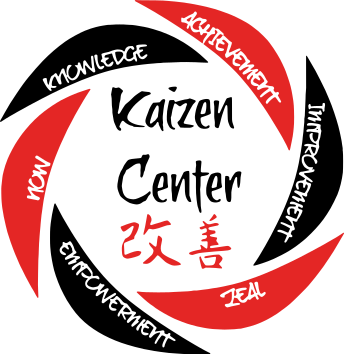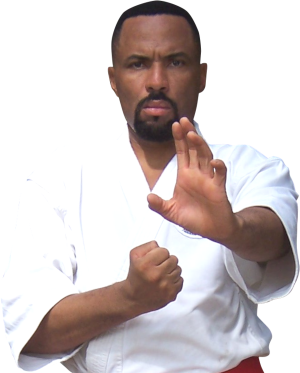


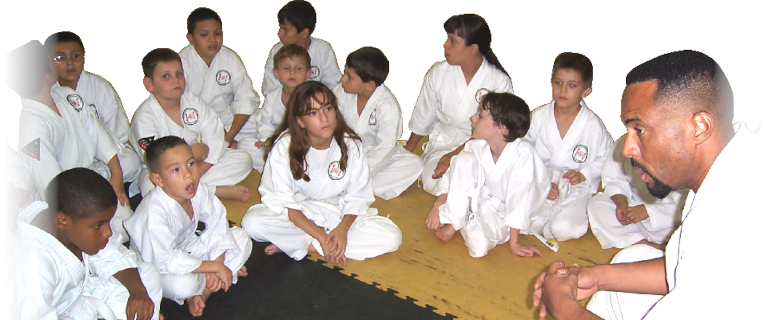
Mental:
Encourage scholastic competence and maximize self-actualization.
Physical:
Condition the mind by raising self-esteem and body by increasing self-control.
Spiritual:
Acknowledge that all good things come from deity.
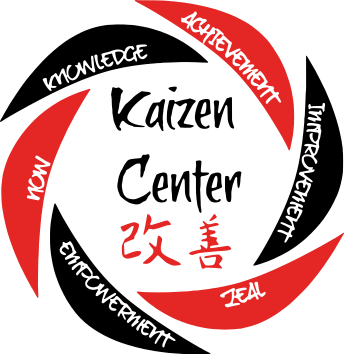
Solutions to the Problem
Too many people live in a perpetual state of failure. Though potentially crippling, failure doesn't have to remain a long-term condition. Temporary failures can be seen in the form of Poverty, Homelessness, Hunger, Stress and Unemployment. The Kaizen Center is organized exclusively for educational purposes to empower individuals and families with tools and skills to overcome their temporary negative conditions. We believe that through education, opportunity and accountability we can instill a long-term sense of discipline and ethics. The resulting opportunities for success are endless.
Stats (Census.gov)
Planned Activities
Outcomes and Evaluation
No one can turn around the lives of hundreds of children in an instant. The Kaizen Center can help at-risk students turn themselves around and learn to succeed. This will be accomplished by an ongoing and healthy mentoring effort, setting incremental goals and developing the habits to acquire them.

There are hundreds of students out there who need the guidance and support of a mentor. How then can we tailor our efforts to become a role model and possibly even a mentor to them?
We must first distinguish ourselves as a role model. A
Martial Artist can use his skills to motivate the students
and serve as a role model to these teens and a mentor to
some.
We will identify ourselves as a role model to all of
the students in our community. Being a role model requires
many things. A large part of the job is being known and
respected for who you are and how you got there. A role
model is a person who sets an example, a person other
people may emulate. Being a role model does not necessarily
require one-on-one, extended contact. A Martial Arts
Instructor can provide mentorship to the masses.
We can fulfill our duty as a role model in many ways. We can become a valuable solution to the problem. By being a good citizen and exhibiting ethical behavior, we are able to show the world and students in the community what it takes to achieve personal and professional success. We will establish partnership with the school districts and local agencies, keeping in mind that presentation is everything and we are what we represent. Every time we speak at an assembly, we have the opportunity to become a role model for the students. Being seen and heard, in person or even in the local paper, will reinforce our status as role models.Professional athletes are judged harshly by society for any indiscretion because they are considered role models to millions of young people. Teens know who the athletes are even though they have not personally met. The same is true for the Martial Artist. The Martial Artist wears a badge of honor that distinguishes him from the average public figure within the community. This makes the Martial Artist a role model. When the Martial Artist talks to young people, they carry the prestige of their accomp-lishment as a Black Belt. In or out of the Dojo (Karate School) environment, the Martial Artist epitomizes the ideals of a successful professional. Many teens may think of a Martial Arts Instructor as one of very few credible role models. As teens mature, they begin to forget about fanciful ideas of being rock and sports stars and begin to look around for realistic opportunities. That's what a Martial Arts environment will represent to them. Karate is not a seasonal sport; it is a way of life, designed to perfect the character of its practitioners.
Being a role model is incredibly rewarding but also requires dedication, caring and personal contact. No one person can be the sole role model to hundreds of students at the same time. Many people in your community want to help with the mentoring process in different ways. By working together with local business, government agencies, Church members, teachers, parents and others in your community, our success could have even more of an impact.
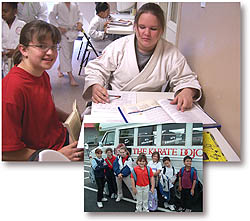 2. Offer after school program for scholastics. Providing
tutoring and homework assistance and development
of core scholastic competence.
2. Offer after school program for scholastics. Providing
tutoring and homework assistance and development
of core scholastic competence.
3. Solicit College and High school graduates and seniors to become peer role models to young students at risk:
These events could focus on the concept of creating a mentoring buddy system. Within the structure of these events, members could be paired up looking out for each other, making sure school attendance is good, homework is turned in, passing grades are maintained and help is sought early, if needed. These events are important tools of the program.
4. Provide spiritual counseling to enhance the member's morality, ethics and faith.
5. Develop confidence, competitive characteristics by promoting and participating in The Amateur Athletic Union (AAU) and local Martial Arts and scholastic competitions.
6. Publicize student success stories in local papers, newsletters or school papers. Invite professionals and athletes to speak at meetings and in schools.
It is a fact that success in lowering the dropout rate, use of drugs and alcohol is achieved by combining a variety of tried-and-true methods. The Kaizen Center will encourage peer culture and a pervasive, positive, structured atmosphere. Martial Arts training and culture has been known to positively influence the teen dropout rate and drug use. There is generally a family atmosphere among students. Students bond together, tend to work out problems together and are supportive of each other.
Nobody can instantly turn around the lives of hundreds of young people in a single effort. Kaizen's dedication and care can help at-risk students begin to turn themselves around and succeed. The name of the game is setting incremental goals. We will be sure to refer teens with serious problems to the appropriate agencies for professional help.
1. Raise student's expectations of the myriad of opportunities available to them if they stay in school, stay off drugs and plan for life.
2. Be sure that schools know what the Kaizen Center expects of its members.
3. Show respect for teachers and community leaders. They can make terrific partners for our crusade.
4. Be a role model and mentor.
